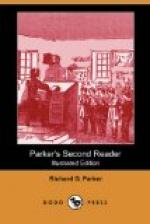Did he recite his lesson correctly, read audibly, and appear to understand what he read?
Was his copy written neatly, his letters made handsomely, and did no blot appear on his book?
Was his wealth stored fraudfully, the spoil of orphans wronged, and widows who had none to plead their rights?
Have not you, too, gone about the earth like an evil genius, blasting the fair fruits of peace and industry?
Is that a map which you have before you, with the leaves blotted with ink?
Will you say that your time is your own, and that you have a right to employ it in the manner you please?
[Sometimes a comma is
to be read like a period, with
the falling inflection
of the voice.]
The teacher directed him to take his seat, to study his lesson, and to pass no more time in idleness.
It is said by unbelievers that religion is dull, unsocial, uncharitable, enthusiastic, a damper of human joy, a morose intruder upon human pleasure.
Charles has brought his pen instead of his pencil, his paper instead of his slate, his grammar instead of his arithmetic.
Perhaps you have mistaken sobriety for dullness, equanimity for moroseness, disinclination to bad company for aversion to society, abhorrence of vice for uncharitableness, and piety for enthusiasm.
Henry was careless, thoughtless, heedless, and inattentive.
[Sometimes the comma
is to be read like an
exclamation.]
O, how can you destroy those beautiful things which your father procured for you! that beautiful top, those polished marbles, that excellent ball, and that beautiful painted kite,—oh, how can you destroy them, and expect that he will buy you new ones!
O, how canst thou renounce the boundless store of charms that Nature to her votary yields! the warbling woodland, the resounding shore, the pomp of groves, the garniture of fields, all that the genial ray of morning gilds, and all that echoes to the song of even, all that the mountain’s sheltering bosom shields, and all the dread magnificence of heaven, oh, how canst thou renounce, and hope to be forgiven!
[Sometimes the comma,
and other marks, are to be read
without any pause or
inflection of the voice.]
You see, boys, what a fine school-room we have, in which you can pursue your studies.
You see, my son, this wide and large firmament over our heads, where the sun and moon, and all the stars, appear in their turns.
Therefore, my child, fear, and worship, and love God.
He that can read as well as you can, James, need not be ashamed to read aloud.
He that can make the multitude laugh and weep as you can, Mr. Shakspeare, need not fear scholars.
[Sometimes the pause
of a comma must be made where
there is no pause in
your book. Spaces are left, in the
following sentences,
where the pause is proper.]




